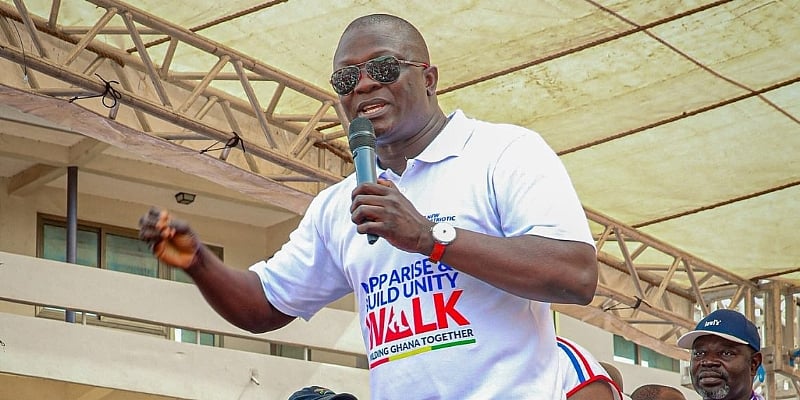The political landscape within Ghana’s New Patriotic Party (NPP) is beginning to stir with whispers and subtle endorsements surrounding the potential presidential candidacy of Dr. Bryan Acheampong, the current Member of Parliament for Abetifi. While Dr. Acheampong himself remains publicly silent on the matter, former MP Andy Appiah-Kubi has strongly hinted at Acheampong’s intentions, suggesting that the groundwork for a 2028 presidential bid is already being laid. Appiah-Kubi’s remarks paint a picture of a strategic, behind-the-scenes effort to position Acheampong as the party’s next flagbearer, highlighting his perceived strengths as a unifying figure with the right blend of leadership experience and intellectual prowess. These early endorsements signal the growing momentum behind Acheampong’s potential candidacy, even before a formal declaration has been made.
Appiah-Kubi’s endorsement carries significant weight, not just as the opinion of a former MP, but as a reflection of sentiments brewing within the NPP. He positions Acheampong as a candidate capable of “redeeming” the party, a carefully chosen word that suggests a need for revitalization and a return to winning ways. This resonates with the current political climate within the NPP, which faces the challenge of regaining power after a potential loss in the 2024 elections. Appiah-Kubi frames Acheampong as the answer to this challenge, presenting him as a beacon of hope and a leader capable of navigating the complex political terrain ahead. He goes on to highlight Acheampong’s unique blend of public service experience and private sector acumen as crucial attributes that can bridge the divide between the party base and undecided voters, emphasizing the strategic advantage this offers in a competitive electoral landscape.
The rationale behind promoting Acheampong seems to stem from the belief that he embodies the qualities needed to unite a potentially fractured party and appeal to a broader electorate. Appiah-Kubi’s description of Acheampong as “a symbol of victory” underscores the desire for a candidate who can project an image of strength and success. This is a critical consideration for any political party, but especially so for the NPP, which will be seeking to reclaim its position as the ruling party. Acheampong’s projected image as a stabilizing force suggests an attempt to present a candidate who can bring calm and assurance in a potentially volatile political climate.
While Appiah-Kubi’s endorsements offer a glimpse into the behind-the-scenes maneuvering within the NPP, Dr. Acheampong’s silence leaves room for speculation and analysis. This strategic silence could serve multiple purposes. It allows him to gauge the level of support within the party and the public’s reaction to his potential candidacy without formally committing himself. Maintaining a low profile at this stage also allows him to avoid the intense scrutiny that comes with a declared candidacy, giving him time to solidify his strategy and build a stronger foundation for his campaign when he chooses to officially enter the race.
The anticipation surrounding Acheampong’s potential candidacy underscores the significance of the 2028 elections for the NPP. They represent an opportunity to regain control of the government and steer the nation’s course. The party’s search for a strong and compelling leader reflects the understanding that the 2028 election will be a closely contested affair, requiring a candidate who can resonate with a broad spectrum of voters. The early buzz surrounding Acheampong suggests that many within the party see him as possessing the qualities needed to lead them to victory in this crucial election.
Ultimately, the success of any potential Acheampong candidacy hinges on several factors. He will need to consolidate support within the party, articulate a clear and compelling vision for the nation, and connect with the electorate on a personal level. While the early endorsements from figures like Appiah-Kubi are undoubtedly positive, the road to the presidency is long and arduous. Acheampong will need to navigate the complex internal politics of the NPP, withstand the scrutiny of the media and the public, and ultimately convince the Ghanaian electorate that he is the right person to lead the country. The coming months and years will reveal whether he can translate this early momentum into a successful presidential bid.














